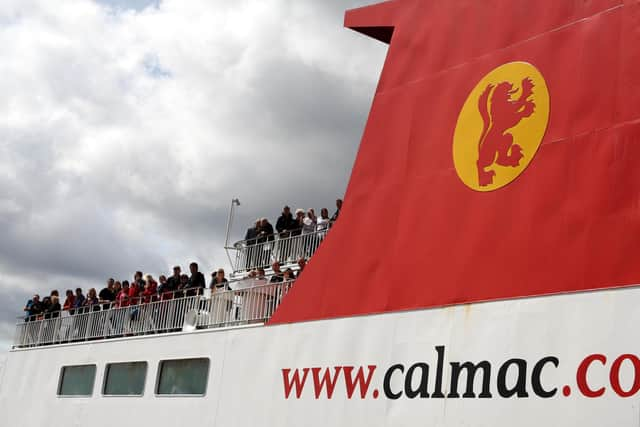Compensation payments to CalMac passengers 'increase eightfold'
Ferry compensation payouts to CalMac ferry passengers have increased almost eightfold in the past six years, according to figures.
The government-owned company paid out £454,165 in 2022-23, according to data obtained by Scottish Labour under a freedom of information request.
Advertisement
Hide AdAdvertisement
Hide AdThe figure has increased from £57,822 – almost eight times less – since 2017-18, with the party claiming the Scottish Government has “no answers” to fix the problems on the ferry network.


Rhoda Grant, Scottish Labour spokesperson on Islands, said: “Islanders are being failed by the SNP and taxpayers are footing the bill.
READ MORE: Ferguson Marine ferries fiasco is a monument to SNP incompetence – Scotsman editorial comment
“Years of failed planning and disastrous delays under the SNP has left us with a ferry fleet too old to function – and now islanders are stuck with chaos, cancellations and delays while taxpayers foot the bill.
“The SNP has no answers to the immediate crisis and no long-term plan to fix this shambles.
“We need urgent action to get services up and running again, and a national ferry building programme to support Scotland’s shipbuilding industry and deliver the ferries we need.”
Under the operator’s passenger rights commitment, CalMac can reimburse food costs, provide overnight accommodation, cover mileage if passengers have to travel to arrive at another port or provide compensation if there is a delay or cancellation relating to a technical fault.
The ferry network has come under criticism in recent years, with a number of technical issues causing disruption and the extensive delays and cost overruns seen in the building of two ships at the Government-owned Ferguson Marine shipyard.
A spokesman for Transport Scotland said: “Scottish ministers fully recognise that every cancelled sailing can have a significant impact on our island communities.
Advertisement
Hide AdAdvertisement
Hide Ad“The provision of safe and reliable lifeline ferry services is crucial to delivering the confidence needed to sustain island communities, businesses, and populations.
“Statistics between October 1 2022 and May 16 2023 show of the 98,267 scheduled sailings across the Clyde and Hebrides Ferry Services network 7,286 (7.4%) were cancelled.
“Of the scheduled sailings, 1,549 (1.6%) were cancelled due to technical issues and 3,541 (3.6%) were cancelled due to weather.
“The issues around support for businesses impacted by ferry cancellations have understandably and rightly been raised with this Government.
“The Scottish Government budget provided for 100% rates relief to island hospitality businesses which will be a welcome support for hotels and other businesses at this time.
“We will continue to do everything possible to ensure that new vessels enter service as quickly as possible, to deliver the service improvements upon which our islands depend.”
CalMac chief executive Robbie Drummond said the firm takes its responsibility to “provide a reliable lifeline ferry service very seriously and work hard to avoid disruption”.
“We recognise that breakdowns and technical faults are extremely challenging for local communities, and we sincerely apologise to those affected when this happens,” he added.
Advertisement
Hide AdAdvertisement
Hide AdMr Drummond said a “record” £34m was spent on fleet maintenance in 2022 which was an increase of around 70% from £20m in 2017.
More than 38% of vessels are over 30 years of age with increasing challenges around obtaining parts.
Investment in maintenance grew to well over £43m in 2023 with 16 new vessels due in the “next few years”.
